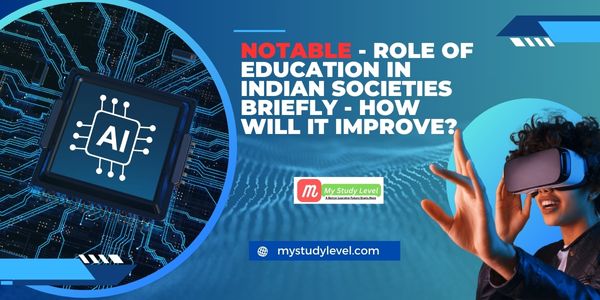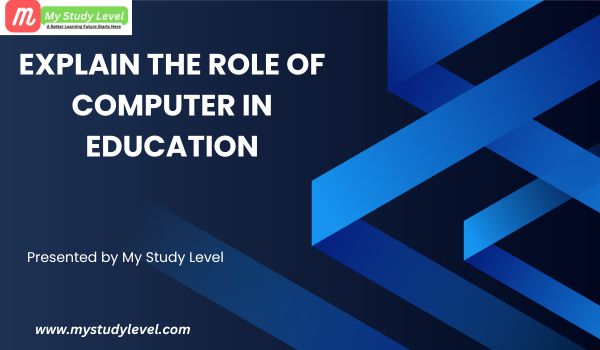Education is the key to progress, shaping individuals and societies for a better future. Would you like a deeper discussion on a specific aspect, such as education policies or global education trends?
role of education
Role of Education in Society
Education is a fundamental pillar of individual growth and societal development. It empowers people with knowledge, skills, and values that shape their personal and professional lives. Here’s why education is crucial:
1. Personal Development
- Enhances critical thinking and problem-solving skills.
- Improves communication and decision-making abilities.
- Encourages creativity, curiosity, and lifelong learning.
role of education
2. Economic Growth & Employment
- Provides job opportunities and higher earning potential.
- Encourages entrepreneurship and innovation.
- Contributes to a skilled and productive workforce.
3. Social Development & Equality
- Promotes gender equality and social inclusion.
- Reduces poverty by creating opportunities for disadvantaged groups.
- Fosters understanding, tolerance, and respect among people.
role of education
4. Strengthening Democracy & Good Governance
- Educated citizens make informed decisions and participate in governance.
- Reduces corruption by promoting transparency and awareness.
- Encourages civic responsibility and social activism.
5. Scientific & Technological Advancements
- Drives research and innovation in various fields.
- Improves healthcare, agriculture, and infrastructure.
- Prepares individuals for an increasingly digital world.
6. Cultural Awareness & Global Perspective
- Preserves cultural heritage while promoting open-mindedness.
- Encourages appreciation of diversity and global collaboration.
- Helps individuals adapt to an interconnected world.
7. Health & Well-being
- Educated individuals make informed health choices.
- Reduces child mortality and improves maternal health.
- Spreads awareness about hygiene, nutrition, and disease prevention.
8. Sustainable Development & Environmental Awareness
- Promotes Eco-friendly practices and conservation efforts.
- Educates about climate change and sustainable resource management.
- Encourages responsible consumption and waste management.
Role of Education in India
Education plays a vital role in shaping India’s sociology-economic and cultural development. It is the foundation for personal growth, social progress, and national development. Here’s how education contributes to India’s progress:
role of education
1. Economic Growth & Employment
- Skilled Workforce: Education provides skills and knowledge, making individuals employable.
- Entrepreneurship: Encourages innovation and startups, boosting economic growth.
- Higher Incomes: Educated individuals earn better wages, reducing poverty.
2. Social Development & Equality
- Empowers Women: Education promotes gender equality by increasing women’s participation in society.
- Reduces Social Disparities: Helps bridge gaps between different communities and economic classes.
- Improves Health Awareness: Educated people make informed health decisions, reducing mortality rates.
3. Strengthening Democracy
- Informed Citizens: Education fosters critical thinking and awareness of rights and duties.
- Encourages Participation: A literate population actively engages in elections and governance.
- Reduces Corruption: Educated individuals are less likely to be influenced by misinformation.
4. Scientific & Technological Advancements
- Boosts Research & Innovation: Higher education institutions contribute to scientific discoveries.
- Encourages Digital Literacy: Helps individuals adapt to the rapidly changing tech landscape.
- Develops STEM Fields: Strengthens India’s position in science, engineering, and medicine.
role of education
5. Cultural & National Identity
- Preserves Heritage: Education promotes awareness of India’s rich cultural history.
- Encourages Unity: Teaches values of diversity, tolerance, and national pride.
- Global Recognition: Educated citizens contribute to India’s influence on the world stage.
6. Rural Development
- Empowers Farmers: Agricultural education helps in modernizing farming techniques.
- Reduces Migration: Educated individuals can create opportunities in rural areas.
- Improves Infrastructure: Knowledge fosters better management of resources and development projects.
7. Challenges & Future Goals
- Bridging Urban-Rural Divide: More focus on rural education and digital accessibility.
- Quality of Education: Enhancing teacher training, infrastructure, and curriculum relevance.
- Higher Education Access: Making universities more affordable and research-oriented.
Education remains a key driver of India’s progress. Would you like insights on government policies, reforms, or challenges in the education sector?
Improvement of Education in Indian Societies
Education in India has seen significant progress, but challenges remain, especially in rural and underprivileged areas. To ensure inclusive and high-quality education, several improvements can be made:
role of education
1. Enhancing Access to Education
✅ Bridging the Urban-Rural Divide
- Expanding schools in remote areas.
- Strengthening digital infrastructure for online learning.
✅ Increasing Enrollment & Retention
- Free education initiatives under the Right to Education (RTE) Act.
- Mid-Day Meal Scheme to encourage school attendance.
- Scholarships and financial aid for economically weaker students.
2. Improving Quality of Education
✅ Teacher Training & Development
- Regular skill development programs for teachers.
- Using technology-based training modules for modern teaching methods.
✅ Updated Curriculum & Practical Learning
- Redesigning syllabus to match global standards and industry needs.
- Encouraging experiential learning, vocational education, and hands-on projects.
✅ Use of Technology in Education
- Smart classrooms, digital libraries, and AI-driven learning platforms.
- Expanding e-learning initiatives like SWAYAM, DIKSHA, and PM eVidya.
role of education
3. Promoting Inclusive & Equitable Education
✅ Women’s Education & Gender Equality
- Initiatives like Beti Bachao Beti Padhao to promote girls’ education.
- Safer school environments and more female teachers.
✅ Education for Marginalized Communities
- Special support for SC/ST and differently-able students.
- Reservation policies in higher education institutions.
4. Strengthening Higher Education & Research
✅ Expanding Higher Education Opportunities
- More universities, skill development institutes, and vocational training centers.
- Focus on STEM (Science, Technology, Engineering, Mathematics) education.
✅ Encouraging Research & Innovation
- More funding for research institutions.
- Strengthening university-industry collaborations.
✅ Boosting Global Competitiveness
- Encouraging Indian universities to rank globally.
- Partnerships with international educational institutions.
role of education
5. Role of Government & Policy Reforms
✅ Implementation of the National Education Policy (NEP) 2020
- Holistic & multidisciplinary education approach.
- Focus on skill-based learning and multiple entry-exit options.
- Introduction of regional languages as a medium of instruction.
✅ Public-Private Partnerships (PPP)
- Collaboration between the government and private sector for better infrastructure.
- Encouraging corporate social responsibility (CSR) funding for education.
6. Encouraging Parental & Community Involvement
✅ Awareness Campaigns
- Educating parents on the importance of education.
- Community-driven efforts to improve school facilities.
✅ Local Participation
- Involving panchayats and local bodies in school management.
- Encouraging volunteering and mentorship programs.
role of education
Conclusion
By improving infrastructure, modernizing curriculum, using technology, and ensuring inclusive education, Indian society can build a more educated and skilled population. Continuous efforts from the government, educators, and communities will be key to shaping a brighter future for India’s youth.
Would you like insights on a specific aspect, like NEP 2020, digital education, or rural education development?
















Leave a Reply